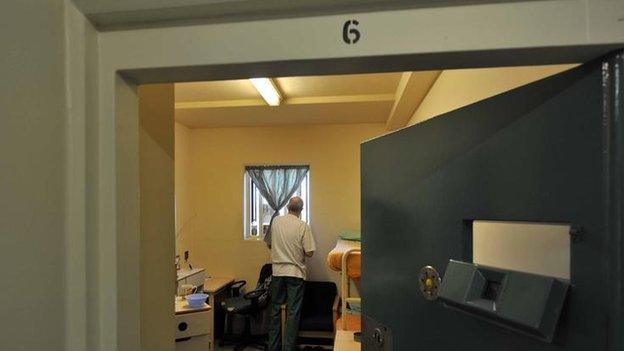Where do prison escapees and absconders actually go?
- Published
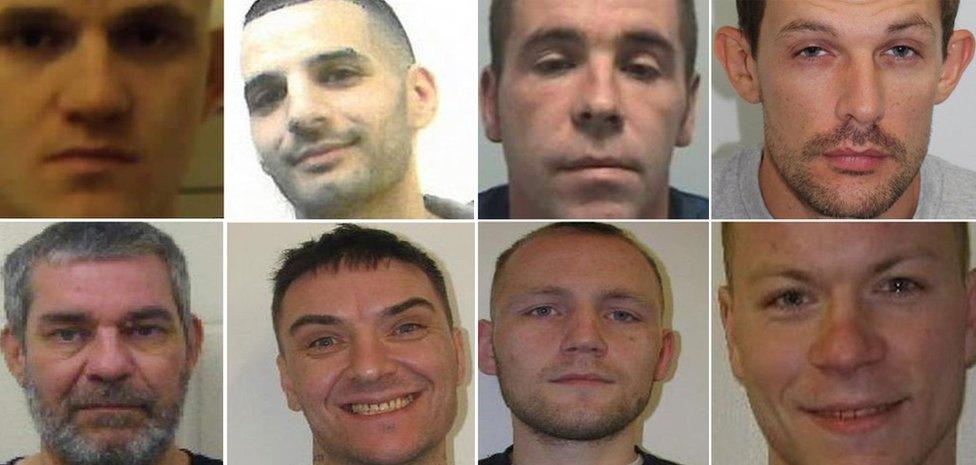
The faces of some England's offenders who have fled lawful custody in the past three years
Beating up love rivals and trying to find gainful employment are among the reasons prisoners have given for "going on the run", it has emerged.
A BBC investigation has sought to find out where people fleeing lawful custody actually go and why.
There were 13 prison escapes and 105 cases of absconding in 2015/2016.
While a significant number of offenders simply go home, where they are usually caught quite quickly, some manage to leave the country.
The BBC asked the Prison Service and every police force in the country where those on the run in the past three years had fled from; where they were caught; how long they were on the loose; and why they decided to flee in the first place.
The results of the investigation come amid the ongoing police hunt for Liverpool killer Shaun Walmsley who fled police in an armed escape outside Aintree University Hospital earlier this week.

Escapee or absconder? What's the difference?

Escapes involve prisoners absenting from prison without lawful authority by overcoming a physical security restraint such as fences, locks, bolts and bars, a secure vehicle or handcuffs
Absconds are where prisoners do not have to overcome physical restraints to leave. Absconds usually occur at open prisons, where it is physically easier to leave
Source: Ministry of Justice

The Ministry of Justice said it did not "routinely gather" or keep such information and refused the BBC's request for information.
However, data supplied by police forces and media reports suggests that the average distance travelled by escapees or absconders is 36 miles (57km) before they are caught.
Although most police forces do not record the reasons inmates go on the run, some do.
Suffolk Police, for example, told how one prisoner who absconded from HMP Hollesley Bay spent nine weeks at large. He claimed he was the victim of repeated bullying and theft in the prison. A second inmate on the run for four weeks told police when caught he absconded as a result of drugs in prison and because he "didn't get on with the Muslims".
Avon and Somerset Police, which provided the most comprehensive information of any force, told of an absconder who fled to try to "visit his ill mother in Australia", another who "wanted to go back to Nottingham and get a job" and a third who wanted "to harm his ex-girlfriend's new partner and move to West Bromwich".
Another, who absconded from HMP Leyhill, claimed he did so because of "continuous offers of drink and drugs".
Faith Spear, the former chairman of the Independent Monitoring Board at HMP Hollesley Bay, has spoken to a number of prisoners who have either absconded or thought about it.
The usual reasons given, she said, were concerns about the distances from family or visits proving too costly.
"Or," she said, "they are (prisoners on) Imprisonment for Public Protection, external and have given up on the system and can not see another way out."

Ashley Fulcher fled from Selby 5,377 miles (8,653 km) to Costa Rica to evade justice
Former prisoner Phil Aldis, who served sentences at both HMP Chelmsford in Essex and HMP Wayland in Norfolk, said personal problems - such as relationship breakdowns, sick family members or desperation at being in prison - were the key reasons why inmates fled.
"There is not a lot of support in prison," said Mr Aldis. "Prisoners do not like speaking to anybody about emotional stuff because they are very worried about being seen as weak.
"Prison can be an extremely lonely place and you keep your emotions bottled up and that causes frustration and desperation."
One of the longest escape distances reported involved Ashley Fulcher, originally from Great Yarmouth and later of Selby, who fled in 2015, apparently for extradition reasons, 5,377 miles (8,653 km) to Costa Rica in Central America.
He was caught by Det Con Chris Ryan, of North Yorkshire Police, after an exhaustive intelligence-based operation in which "little bits of information" and close liaison with the Costa Rican authorities revealed his whereabouts.
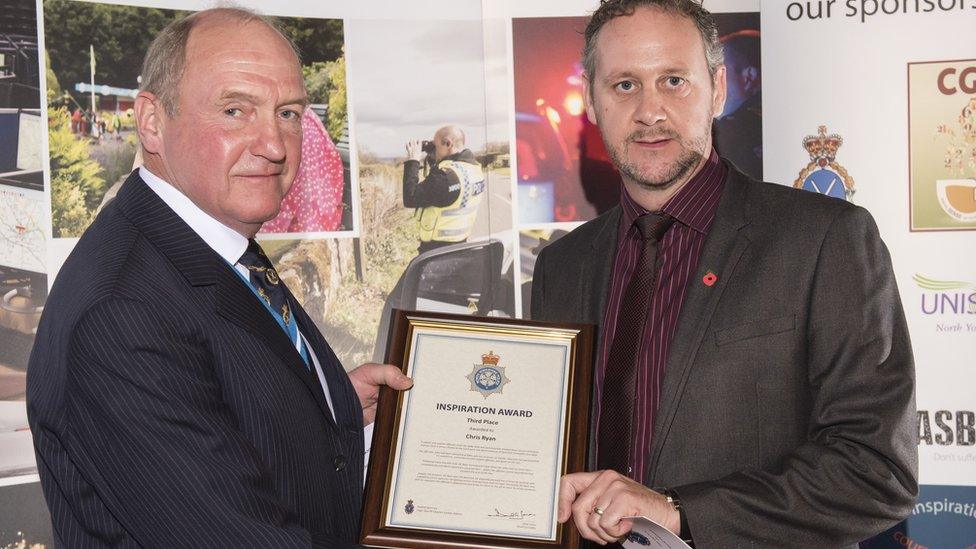
Det Con Chris Ryan (right) won an award from North Yorkshire Police for his detective work in tracking Ashley Fulcher to Costa Rica
Fulcher was trying to board a plane to Mexico when he was caught by the Costa Rican authorities on visa offences, Det Con Ryan said.
Det Con Ryan put on his police uniform at Heathrow Airport to arrest Fulcher, who told officers he fled because he was scared of a long prison sentence.
"You've been staring at a photograph of this guy for a long time and you've been doing all this work," the officer said. "You can't wait to get hold of him and put the cuffs on.
"On the drive back up to Yorkshire, Fulcher said he was actually quite pleased to be back in the UK. He had been a big fish in his home town.
"In Costa Rica, there are criminals with guns. He was genuinely quite glad to be back."

Where were they found?
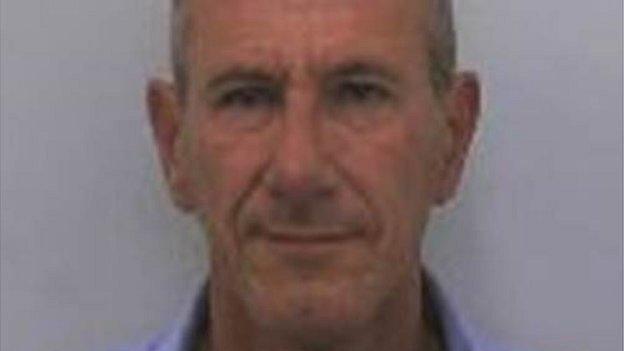
Robert Hennessey was detained aged 14 for the manslaughter of his aunt
Although there are more than 100 prisons across the UK, the story of prison absconds can be encapsulated in just a single prison.
Take HMP Leyhill, external in Wotton-under-Edge for example. Avon and Somerset Police have 14 records of absconders from the Category D prison over the period 2014-2016.
Two of those who absconded were found in their parents' homes, while a further two simply handed themselves in to police after travelling up to 130 miles (210km).
One was found in woods by police close to the prison and a second was spotted in a road just a few miles away.
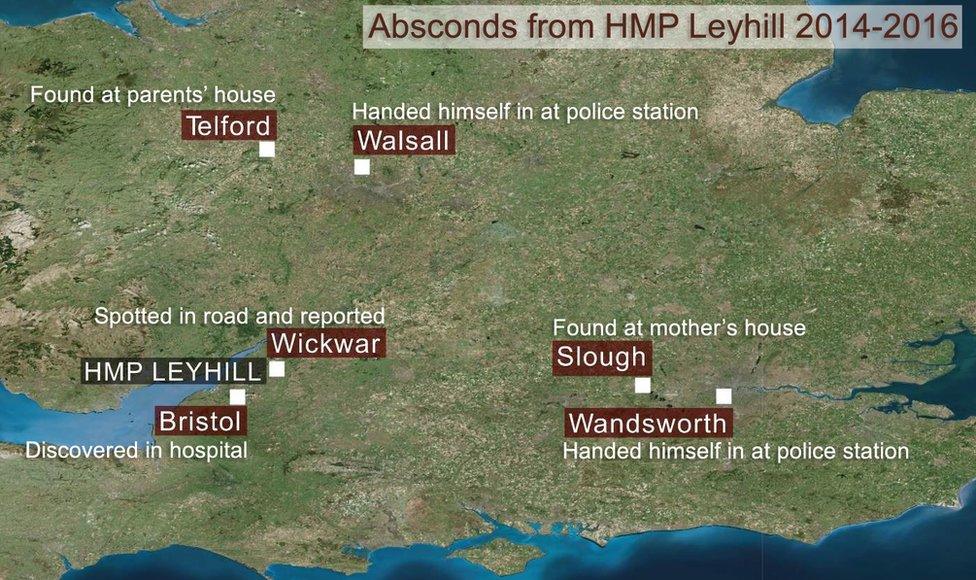
Just one prison: Data supplied by police revealed where absconders from HMP Leyhill were eventually arrested
The most intriguing case is that of Robert Hennessey who walked out of HMP Leyhill in November 1998 while serving a life sentence for the manslaughter of his aunt in Plymouth in 1978.
Using false documents, including a fake passport, he travelled extensively before ending up in the Queensland area of Australia. It was here that he was jailed for credit card scams before being deported back to the UK in 2015. He admitted evading lawful custody and was sentenced to 16 months.

- Published27 October 2016

- Published1 July 2014

- Published19 May 2014
